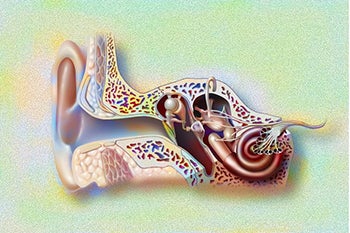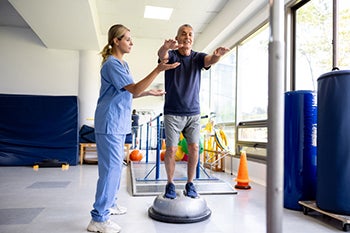Vestibular Rehabilitation Therapy
Feeling dizzy, unsteady or disoriented is not only unpleasant – it can put you at risk for falls and serious injuries. At WakeMed, our vestibular rehabilitation therapy program aims to help our patients decrease dizziness and vertigo and improve their sense of stability and balance.
What is the Vestibular System?
 The vestibular system is a complex sensory system which includes parts of the inner ear as well as its connections with the brain and eyes. This system plays an important role in sensing movement and where your body is in space so you can feel steady, keep your balance and see clearly when you are moving. When the system’s connection is compromised by injury, aging or disease, your central nervous system can’t process information correctly.
The vestibular system is a complex sensory system which includes parts of the inner ear as well as its connections with the brain and eyes. This system plays an important role in sensing movement and where your body is in space so you can feel steady, keep your balance and see clearly when you are moving. When the system’s connection is compromised by injury, aging or disease, your central nervous system can’t process information correctly.
Vestibular rehab focuses on targeted exercises to restore these connections, ultimately reducing your symptoms of dizziness and imbalance.
How Vestibular Rehab Can Help with Dizziness and Imbalance
Balance is a skill that coordinates multiple systems in the body, and specific, targeted exercise helps these systems work together in a coordinated fashion. Because balance issues and dizziness may affect you in different ways, the goals of vestibular rehab may differ depending on the underlying conditions causing your dizziness.

A physical therapist will perform a comprehensive musculoskeletal, balance, gait and vertigo assessment to determine what problems are contributing to your dizziness and balance issues. From this information, the therapist will create a personalized treatment plan made up of exercises to specially address your unique challenges, lifestyle and exercise tolerance. These exercises can include repositioning maneuvers, habituation exercises, gaze stability exercises and balance training.
Vestibular Diagnoses & Disorders We Treat
Patients typically referred for vestibular rehab have been diagnosed with a vestibular condition including:
- Benign Positional Paroxysmal Vertigo (BPPV)
- Vestibular Neuritis or Labyrinthitis
- Concussion
- Persistent Postural-Perceptual Dizziness (PPPD)
- Vestibular Migraines
- Central Nervous System Disorders, such as stroke or brain injuries
- Acoustic Neuroma
- Meniere’s Disease
If you have not yet been assessed or diagnosed with a vestibular condition, common symptoms usually include:
- General dizziness or lightheadedness
- Imbalance and difficulty walking
- Feeling unsteady or disoriented when you move or are in busy places
- Frequent falls
- Nausea
- Vertigo (a feeling of spinning or movement, such as rocking)
- Blurred vision
- Motion Sensitivity
Is Vestibular Rehab Right for Me?
If you are interested in a vestibular assessment and evaluation, call 919-350-7000 to schedule an appointment today at a WakeMed Outpatient Rehabilitation location near you. A physician referral is required for outpatient rehab services.